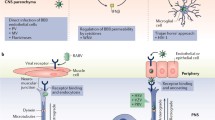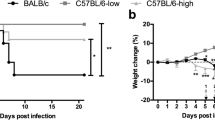Summary
Viral infections of the central nervous system (CNS) following peripheral inoculation of Sindbis viruses were studied. The use of viral strains, which vary in their neuroinvasive and neurovirulent properties, and various strains of mice, which differ in immunocompetence, revealed several pathways of viral neuroinvasion in adult mice. A genetic-trait dependent mechanism was exhibited by the neuroinvasive viruses, showing a similar pattern in all mice strains tested. A second mechanism, dependent on a prolonged high viral load, was exhibited by a noninvasive variant in Severe Combined ImmunoDeficient (SCID) mice. The absence of antiviral antibodies in SCID mice allowed the maintenance of a long-term high viremia, leading to a random entry to the CNS and proliferation in brain tissue. An additional pathway for neuroinvasion was induced upon disruption of the blood-brain barrier activity by exogenous reagents and was demonstrated in cases of short lived high viremia of noninvasive viruses.
Similar content being viewed by others
Author information
Authors and Affiliations
Additional information
Received August 30, 1998 Accepted December 2, 1998
Rights and permissions
About this article
Cite this article
Lustig, S., Halevy, M., Ben-Nathan, D. et al. The role of host immunocompetence in neuroinvasion of Sindbis virus. Arch. Virol. 144, 1159–1171 (1999). https://doi.org/10.1007/s007050050576
Published:
Issue Date:
DOI: https://doi.org/10.1007/s007050050576




